超验主义文学英文版介绍
- 格式:ppt
- 大小:540.50 KB
- 文档页数:36
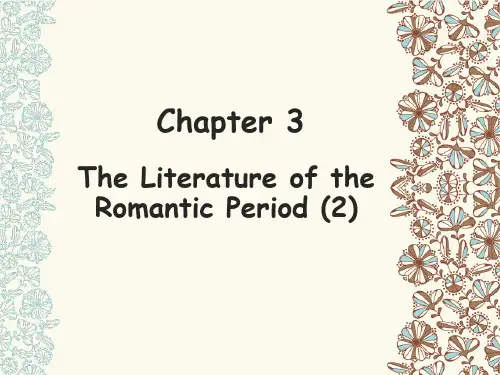
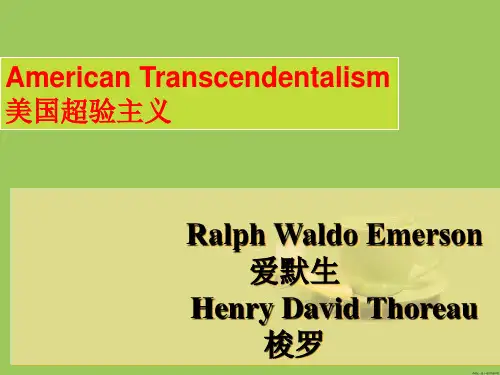
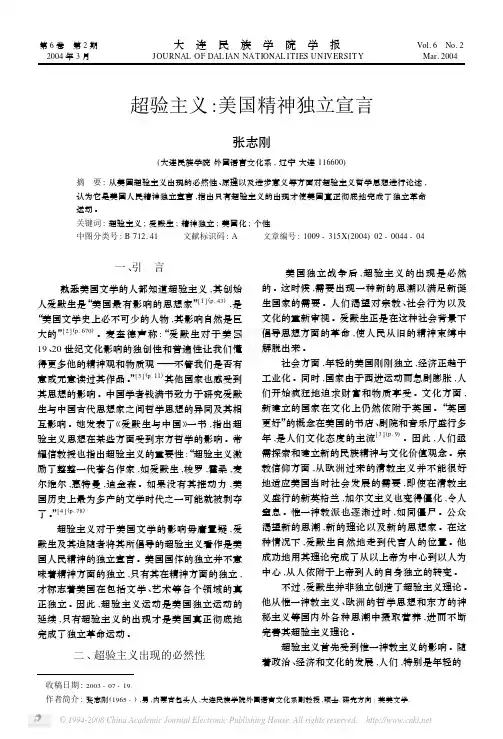
超验主义:美国精神独立宣言张志刚(大连民族学院外国语言文化系,辽宁大连116600)摘 要:从美国超验主义出现的必然性、原理以及进步意义等方面对超验主义哲学思想进行论述,认为它是美国人民精神独立宣言,指出只有超验主义的出现才使美国真正彻底地完成了独立革命运动。
关键词:超验主义;爱默生;精神独立;美国化;个性中图分类号:B 712.41 文献标识码:A 文章编号:1009-315X (2004)02-0044-04一、引 言 熟悉美国文学的人都知道超验主义,其创始人爱默生是“美国最有影响的思想家”[1](p.43),是“美国文学史上必不可少的人物,其影响自然是巨大的”[2](p.670)。
麦奎德声称:“爱默生对于美国19、20世纪文化影响的独创性和普遍性让我们懂得更多他的精神观和物质观———不管我们是否有意或无意读过其作品。
”[3](p.11)其他国家也感受到其思想的影响。
中国学者钱满书致力于研究爱默生与中国古代思想家之间哲学思想的异同及其相互影响。
她发表了《爱默生与中国》一书,指出超验主义思想在某些方面受到东方哲学的影响。
常耀信教授也指出超验主义的重要性:“超验主义激励了整整一代著名作家,如爱默生,梭罗,霍桑,麦尔维尔,惠特曼,迪金森。
如果没有其推动力,美国历史上最为多产的文学时代之一可能就被剥夺了。
”[4](p.78)超验主义对于美国文学的影响毋庸置疑,爱默生及其追随者将其所倡导的超验主义看作是美国人民精神的独立宣言。
美国国体的独立并不意味着精神方面的独立,只有其在精神方面的独立,才标志着美国在包括文学、艺术等各个领域的真正独立。
因此,超验主义运动是美国独立运动的延续,只有超验主义的出现才是美国真正彻底地完成了独立革命运动。
二、超验主义出现的必然性 美国独立战争后,超验主义的出现是必然的。
这时候,需要出现一种新的思潮以满足新诞生国家的需要。
人们渴望对宗教、社会行为以及文化的重新审视。
爱默生正是在这种社会背景下倡导思想方面的革命,使人民从旧的精神束缚中解脱出来。
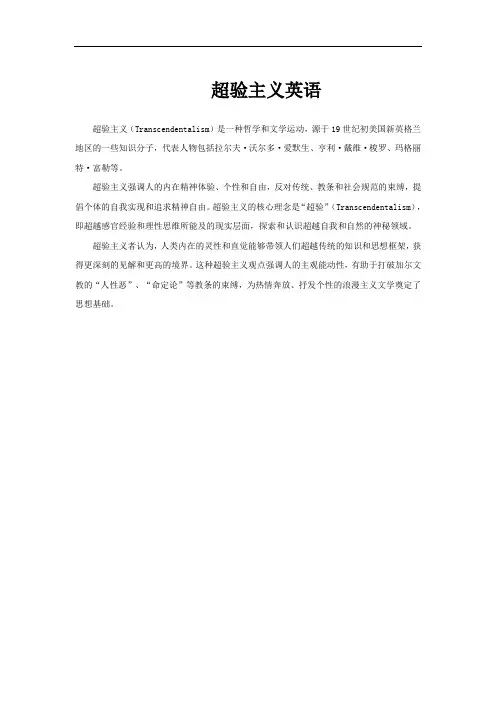
超验主义英语
超验主义(Transcendentalism)是一种哲学和文学运动,源于19世纪初美国新英格兰地区的一些知识分子,代表人物包括拉尔夫·沃尔多·爱默生、亨利·戴维·梭罗、玛格丽特·富勒等。
超验主义强调人的内在精神体验、个性和自由,反对传统、教条和社会规范的束缚,提倡个体的自我实现和追求精神自由。
超验主义的核心理念是“超验”(Transcendentalism),即超越感官经验和理性思维所能及的现实层面,探索和认识超越自我和自然的神秘领域。
超验主义者认为,人类内在的灵性和直觉能够带领人们超越传统的知识和思想框架,获得更深刻的见解和更高的境界。
这种超验主义观点强调人的主观能动性,有助于打破加尔文教的“人性恶”、“命定论”等教条的束缚,为热情奔放、抒发个性的浪漫主义文学奠定了思想基础。
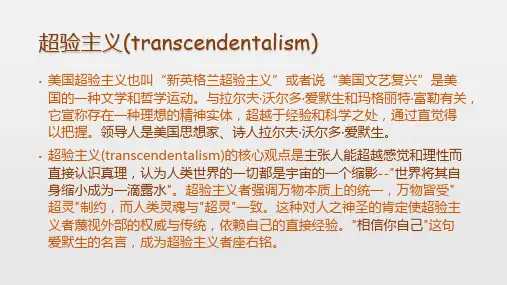
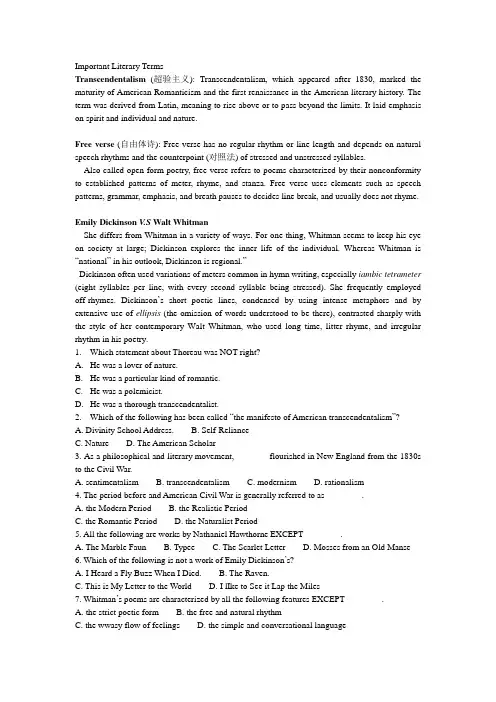
Important Literary TermsTranscendentalism(超验主义): Transcendentalism, which appeared after 1830, marked the maturity of American Romanticism and the first renaissance in the American literary history. The term was derived from Latin, meaning to rise above or to pass beyond the limits. It laid emphasis on spirit and individual and nature.Free verse (自由体诗): Free verse has no regular rhythm or line length and depends on natural speech rhythms and the counterpoint (对照法) of stressed and unstressed syllables.Also called open-form poetry, free verse refers to poems characterized by their nonconformity to established patterns of meter, rhyme, and stanza. Free verse uses elements such as speech patterns, grammar, emphasis, and breath pauses to decides line break, and usually does not rhyme.Emily Dickinson V.S Walt WhitmanShe differs from Whitman in a variety of ways. For one thing, Whitman seems to keep his eye on society at large; Dickinson explores the inner life of the individual. Whereas Whitman is “national” in his outlook, Dickinson is regional.”Dickinson often used variations of meters common in hymn writing, especially iambic tetrameter (eight syllables per line, with every second syllable being stressed). She frequently employed off-rhymes. Dickinson’s short poetic lines, condensed by using intense metaphors and by extensive use of ellipsis (the omission of words understood to be there), contrasted sharply with the style of her contemporary Walt Whitman, who used long time, litter rhyme, and irregular rhythm in his poetry.1.Which statement about Thoreau was NOT right?A.He was a lover of nature.B.He was a particular kind of romantic.C.He was a polemicist.D.He was a thorough transcendentalist.2.Which of the following has been called “the manifesto of American transcendentalism”?A. Divinity School Address.B. Self-RelianceC. NatureD. The American Scholar3. As a philosophical and literary movement, _______ flourished in New England from the 1830s to the Civil War.A. sentimentalismB. transcendentalismC. modernismD. rationalism4. The period before and American Civil War is generally referred to as ________.A. the Modern PeriodB. the Realistic PeriodC. the Romantic PeriodD. the Naturalist Period5. All the following are works by Nathaniel Hawthorne EXCEPT ________.A. The Marble FaunB. TypeeC. The Scarlet LetterD. Mosses from an Old Manse6. Which of the following is not a work of Emily Dickinson’s?A. I Heard a Fly Buzz When I Died.B. The Raven.C. This is My Letter to the WorldD. I lIke to See it Lap the Miles7. Whitman’s poems are characterized by all the following features EXCEPT ________.A. the strict poetic formB. the free and natural rhythmC. the wwasy flow of feelingsD. the simple and conversational language8. As a philosophical and literary moment, ________ fourished in New England from the 1830s to the Civil War.A. modernismB. rationalismC. sentimentalismD. transcendentalism9. Which book is not written by Emerson?A. The American ScholarB. Self-RelianceC. NatureD. Civil Disobedience10. The finest example of Hawthorn’s symbolism is the recreation of Puritan Boston in ______.A. The Scarlet LetterB. Young Goodman BrownC. The Marble FaunD. The Ambitious Guest11. The chief spokesman of New England Transcendentalism is ________.A, Nathaniel Hawthorn B. Ralph Waldo EmersonC. Henry David ThoreauD. Washington Irving12. Transcendentalists recognized _______as the “highest power of the soul”.A. intuitionB. logicC. data of the sensesD. thinking13. American literature produced only one female poet during the nineteenth century. This was ________.A. Anne BradstreetB. Jane AustinC. Emily DickinsonD. Harriet Beecher14. Captain, My Captain is written for ________.A. LincolnB. WhitmanC. WashingtonD. Hemingway15. Which of the foolowing was written by Thoreau?A. NatureB. Walden.C. The Scarlet LetterD. The Fall of the House of Usher16. Which of the following books is a tremendous chronicle of an appalling voyage in pursuit of a seemingly supernatural white whale?A. The Scarlet LetterB. Moby DickC. The Marble FaunD. Moses from an old Manse17. Ralph Waldo Emerson is the most outstanding of all the _______ writers in _______ literature.A. transcendental/ EnglishB. transcendental/ AmericanC. realistic/ EnglishD. realistic / American18. Edgar Allan Poe occupies an important position in American literature as a poet and a ______.A. short story writerB. novelistC. dramatistD. translator19. In Walden, who urges people to simplify their lives and look to nature for meaning?A. Robert FrostB. Walt WhitmanC. Henry David ThoreauD. Herman Melville20. The setting of the novel The Scarlet Letter by Nathaniel Hawthorne id in ________.A. England during World War IIB. Paris during the French RevolutionC. the Middle Ages in ItalyD. Puritan America。
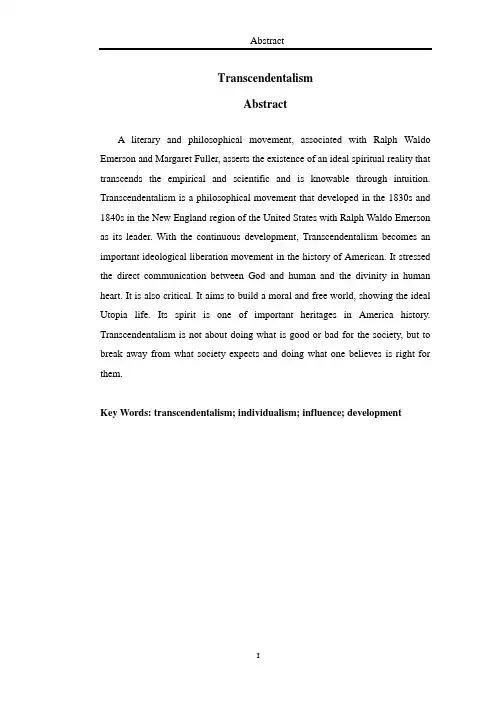
TranscendentalismAbstractA literary and philosophical movement, associated with Ralph Waldo Emerson and Margaret Fuller, asserts the existence of an ideal spiritual reality that transcends the empirical and scientific and is knowable through intuition. Transcendentalism is a philosophical movement that developed in the 1830s and 1840s in the New England region of the United States with Ralph Waldo Emerson as its leader. With the continuous development, Transcendentalism becomes an important ideological liberation movement in the history of American. It stressed the direct communication between God and human and the divinity in human heart. It is also critical. It aims to build a moral and free world, showing the ideal Utopia life. Its spirit is one of important heritages in America history. Transcendentalism is not about doing what is good or bad for the society, but to break away from what society expects and doing what one believes is right for them.Key Words: transcendentalism; individualism; influence; development超验主义摘要超验主义(英文:Transcendentalism,也叫“新英格兰超验主义”或者说“美国文艺复兴”)是美国的一种文学和哲学运动。
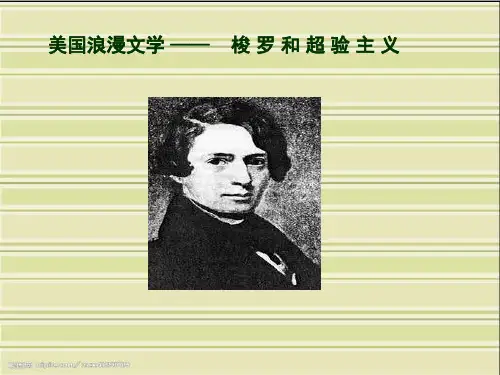
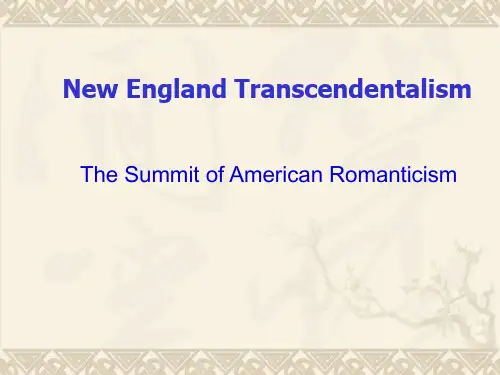

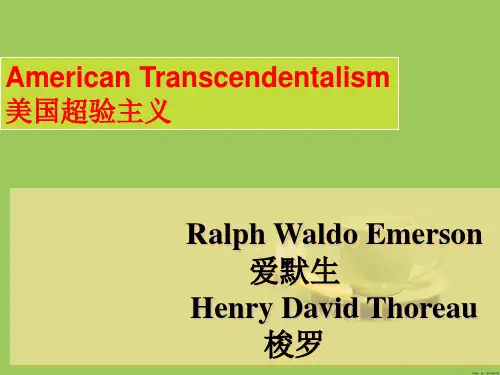
美国超验主义(American Transcendentalism)是美国的一个重要思潮,它兴起于十九世纪三十年代的新英格兰地区,但波及其他地方,成为美国思想史上一次重要的思想解放运动。
它是与拉尔夫·沃尔多·爱默生以及梭罗相关的一种文学和哲学运动,宣称存在一种理想的精神实体,超越于经验和科学之处,通过直觉得以把握。
超验主义是美国文学的第三个阶段,真正开始影响美国的文学风格。
超验主义的主要思想观点有三。
首先,超验主义者强调精神,或超灵,认为这是宇宙至为重要的存在因素。
超灵是一种无所不容、无所不在、扬善抑恶的力量,是万物之本、万物之所属,它存在于人和自然界内。
其二,超验主义者强调个人的重要性。
他们认为个人是社会的最重要的组成部分,社会的革新只能通过个人的修养和完善才能实现。
因此人的首要责任就是自我完善,而不是刻意追求金玉富贵。
理想的人是依靠自己的人。
其三,超验主义者以全新的目光看待自然,认为自然界是超灵或上帝的象征。
在他们看来,自然界不只是物质而已。
它有生命,上帝的精神充溢其中,它是超灵的外衣。
因此,它对人的思想具有一种健康的滋补作用。
超验主义主张回归自然,接受它的影响,以在精神上成为完人。
这种观点的自然内涵是,自然界万物具象征意义,外部世界是精神世界的体现。
1.New England Transcendentalism and the Romantic AgeEven after the 13 colonies gained independence from English control, despite their political independence, Americans acknowledged much the same literary canon as the British. Educated Americans in the new Republic were more familiar with Greek, Roman and European history and literature than with American writers of the colonial and Revolutionary eras. Educated American children learned Greek and Latin literature in childhood. In 1820 it was still possible for a British critic, Sydney Smith, to ask, “Who reads an American book?” Smith, like many other Europeans, wondered why any intelligent person would want to bother reading books from such an unformed, uncultured, unsophisticated place as America.But after the Thirteen States gained independence, geographically the new nation expanded quickly. For instance, in 1803, the U.S. purchased the Louisiana Territory from France, and this vastly enlarged the US territory. By 1821 ten new states had joined the original thirteen. Settlers moved west; roads and waterways improved. Steamships created a new network of trade and communication. New factories and mills made the nation less an agricultural economy and a more urban and industrialized society.As Americans continued to build the nation, an increasing nationalism developed. Americans began to call for a literature that would be less dependent upon European models, one that would express their Americanism. Such works appeared with the publication of Washington Irving’s Sketch Book(1820), with “Rip Van Winkle” a nd “The Legend of Sleepy Hollow” included. American literature of lasting value was beginning to be created. In close succession, in 1823 James Fenimore Cooper published The Pioneers, the first of his Leather-stocking novels, and in 1827 Edgar Allan Poe’s first volume of poetry came out.Why are these writers and their works so special? That’s because they began writing about American people in American places dealing with American problems. It is true that their characters and settings were not always American, and their forms were usually British. But in spite of everything, they did take the first steps. They wrote about the American wilderness, the Revolution, pioneers, American town and city life. They praised American heroes and American artists and told American tales. Their subjects were freedom, expansion, the individual — definitely not European subjects. More remarkable was Emerson. Irving and Cooper had made first steps towards Americanism, but they seemed to be still a bit provincial, still under the influence of English and other European writers. The first steps taken by Irving, Cooper and Poe had to be lengthened. The giant strides were taken by Emerson. In 1837, Emerson published his stirring lecture The American Scholar, which was often call ed America’s intellectual declaration of independence. Emerson exclaimed, “We will walk on our own feet; we will work with our own hands; we will speak our own minds.”The nation listened and took the words to heart. Increasingly, American writers began to free themselves from European models. During a relatively few years, concentrating around Boston and the village of Concord, a number of writers appeared. We now think of them as “classic” writers. Such writers as Ralph Waldo Emerson, Nathaniel Hawthorne, Henry David Thoreau, Herman Melville, Walt Whitman, Emily Dickinson,collectively brought about the Renaissance of New England.We say these writers are great because for many readers their work has a vitality and originality that endures, that transcends time and place.Ralph Waldo Emerson: The giant of American TranscendentalismBorn in Boston, Ralph Waldo Emerson was the son of a Unitarian minister who died when Waldo was 8 years old. He attended Harvard, studied theology, and became a Unitarian minister himself in 1829.Emerson’s dedication to the ministry was to a life of public service through eloquence, not to a life of preserving and disseminating religious dogma. Emerson’s skepticism toward Christianity was strengthened by his exposure to the German “higher criticism.”1In 1832, for reasons of conscience, Emerson resigned his ministry and sailed to Europe.In Europe he met the English writers Wordsworth, Coleridge and Carlyle.After returning from Europe, he settled in the village of Concord, Massachusetts and began his lifelong career as lecturer and writer. It was at Concord that Emerson composed his first book, Nature (1936). His address called The American Scholar (1937) has been an inspiration to generations of young Americans, but Emerson did not achieve national fame until his Essays appeared in 1841. Then came Essays: Second Series (1844), Representative Men (1849), and The Conduct of Life (1860). When he was a young man, Emerson began writing journals and taking notes. In his journals he would write down his daily thoughts and observations. In his note-books he would put down notes on his wide reading. He called these journals and notebooks his “Savings Bank”, from which he would “withdraw” the language and ideas for lectures. With many deliveries, the lectures became polished and improved, then often became the basis for his essays. And in turn, these essays were important influences upon so many American writers, including Thoreau, Whitman, Dickinson, and Frost. Modern literary historians see Emerson as the seminal writer of the century.1Higher criticism is t he name given in the 19th century to a branch of biblical scholarship concerned with establishing the dates, authorship, sources, and interrelations of the various books of the Bible, often with disturbing results for orthodox Christian dogma. It was “higher” not in status but in the sense that it required a preliminary basis of “lower” textual criticism, which reconstructed the original wording of biblical texts from faulty copies. (高等考证,指用科学方法对基督教《圣经》各书的作者、写作日期、写作目的等所作的考证)Yet Emerson’s great influence extended beyond the literary community and went to the American people at large. His optimism, his belief in the vast possibilities of mind and spirit, and his doctrine of self-reliance well suited a democratic, progressive nation.Nature is one of Emerson’s best-known and most influential essays. It is a lyrical expression of the harmony Emerson felt between himself and nature.NatureIntroduction (excerpt)Our age is retrospective(回顾的). It builds the sepulchers(坟墓)of the fathers. It writes biographies, histories, and criticism. The foregoing generations beheld God and nature face to face; we, through their eyes. Why should not we also enjoy an original relation to the universe? Why should not we have a poetry and philosophy of insight and not of tradition, and a religion by revelation to us, and not the history of theirs? Embosomed(环绕)for a season in nature, whose floods of life stream around and through us, and invite us by the powers they supply, to action proportioned to nature, why should we grope among the dry bones of the past, or put the living generation into masquerade(化装舞会)out of its faded wardrobe? The sun shines to-day also. There is more wool and flax in the fields. There are new lands, new men, new thoughts. Let us demand our own works and laws and worship.Chapter I (Excerpt)To go into solitude, a man needs to retire as much from his chamber as from society. I am not solitary whilst I read and write, though nobody is with me. But if a man would be alone, let him look at the stars. The rays that come from those heavenly worlds will separate between him and what he touches. One might think the atmosphere was made transparent with this design, to give man, in the heavenly bodies, the perpetual presence of the sublime(崇高). Seen in the streets of cities, how great they are! If the stars should appear one night in a thousand years, how would men believe and adore; and preserve for many generations the remembrance of the city of God which had been shown! But every night come out these envoys(使者)of beauty, and light the universe with their admonishing(微微责备的)smile.The stars awaken a certain reverence, because though always present, they are inaccessible; but all natural objects make a kindred impression, when the mind is open to their influence. Nature never wears a mean appearance. Neither does the wisest man extort her secret, and lose his curiosity by finding out all her perfection. Nature never became a toy to a wise spirit. The flowers, the animals, the mountains, reflectedthe wisdom of his best hour, as much as they had delighted the simplicity of his childhood. When we speak of nature in this manner, we have a distinct but most poetical sense in the mind. We mean the integrity(完整,完善)of impression made by manifold(多种多样的)natural objects. It is this which distinguishes the stick of timber of the wood-cutter, from the tree of the poet. The charming landscape which I saw this morning, is indubitably made up of some twenty or thirty farms. Miller owns this field, Locke that, and Manning the woodland beyond. But none of them owns the landscape. There is a property in the horizon which no man has but he whose eye can integrate(使结合成为整体)all the parts, that is, the poet. This is the best part of these men's farms, yet to this their warranty-deeds(地契)give no title.To speak truly, few adult persons can see nature. Most persons do not see the sun. At least they have a very superficial seeing. The sun illuminates only the eye of the man, but shines into the eye and the heart of the child. The lover of nature is he whose inward and outward senses are still truly adjusted to each other; who has retained the spirit of infancy even into the era of manhood. His intercourse with heaven and earth, becomes part of his daily food. In the presence of nature, a wild delight runs through the man, in spite of real sorrows. Nature says: He is my creature, and maugre (不管) all his impertinent(不合理的)griefs, he shall be glad with me. Not the sun or the summer alone, but every hour and season yields its tribute of delight; for every hour and change corresponds to and authorizes a different state of the mind, from breathless noon to grimmest midnight. Nature is a setting that fits equally well a comic or a mourning piece. In good health, the air is a cordial(兴奋剂)of incredible virtue. Crossing a bare common, in snow puddles, at twilight, under a clouded sky, without having in my thoughts any occurrence of special good fortune, I have enjoyed a perfect exhilaration(愉悦). I am glad to the brink of fear. In the woods too, a man casts off his years, as the snake his slough([slΛf]蛇蜕皮), and at what period soever of life, is always a child. In the woods, is perpetual youth. Within these plantations of God, a decorum(端庄得体)and sanctity(圣洁)reign, a perennial festival is dressed, and the guest sees not how he should tire of them in a thousand years. In the woods, we return to reason and faith. There I feel that nothing can befall me in life—no disgrace, no calamity, (leaving me my eyes,) which nature cannot repair. Standing on the bare ground— my head bathed by the blithe(无忧无虑的)air, and uplifted into infinite space—all mean egotism vanishes. I become a transparent eye-ball; I am nothing; I see all; the currents of the Universal Being circulate through me; I am part or particle of God. The name of the nearest friend sounds then foreign and accidental: to be brothers, to be acquaintances, master or servant, is then a trifle and a disturbance.I am the lover of uncontained and immortal beauty. In the wilderness, I find something more dear and connate(天生的)than in streets or villages. In the tranquil landscape, and especially in the distant line of the horizon, man beholds somewhat as beautiful as his own nature.The greatest delight which the fields and woods minister(提供), is the suggestion of an occult(玄妙的)relation between man and the vegetable. I am not alone and unacknowledged. They nod to me, and I to them. The waving of the boughs in the storm, is new to me and old. It takes me by surprise, and yet is not unknown. Its effectis like that of a higher thought or a better emotion coming over me, when I deemed I was thinking justly or doing right.Yet it is certain that the power to produce this delight, does not reside in nature, but in man, or in a harmony of both. It is necessary to use these pleasures with great temperance. For, nature is not always tricked(打扮)in holiday attire, but the same scene which yesterday breathed perfume and glittered as for the frolic(嬉戏)of the nymphs(仙女,精灵), is overspread with melancholy today. Nature always wears the colors of the spirit. To a man laboring under calamity, the heat of his own fire hath sadness in it. Then, there is a kind of contempt of the landscape felt by him who has just lost by death a dear friend. The sky is less grand as it shuts down over less worth in the population.STUDY QUESTIONSRecallingHow does Emerson describe the lover of nature?ExtendingWhat do you think is the difference between the kind of meaning Emerson finds in nature and the meaning a botanist, a geographer, or an astrophysicist finds in nature?The American Scholar (excerpt)Each age, it is found, must write its own books; or rather, each generation for the next succeeding. The books of an older period will not fit this……Meek young men grow up in libraries believing it their duty to accept the views which Cicero2, which Locke3, which Bacon4 have given, forgetful that Cicero, Locke, and Bacon were only young men in libraries when they wrote these books.Hence, ins tead of Man Thinking we have the bookworm……2Cicero (106-43 BC,西塞罗),a Roman philosopher, statesman, lawyer, orator, political theorist, consul and constitutionalist. He is widely considered one of Rome’s greatest orators and prose stylists.3J ohn Locke (1632-1704, 洛克), an English philosopher and physician regarded as one of the most influential of Enlightenment thinkers.4Francis Bacon (1561-1626), an English philosopher, statesman, scientist, jurist, and author. Although his political career ended in disgrace, he remained extremely influential through his works, especially as philosophical advocate and practitioner of the Scientific method during the scientific revolution.Books are the best of things, well used; abused, among the worst. What is the right use? ……They are for nothing but to inspire. I had better never see a book, than to be warped(使弯曲,使不正常) by its attraction clean out of my own orbit, and made a satellite instead of a system. The one thing in the world, of value(有价值的), is the active soul. This every man is entitled to; this every man contains within him, although, in almost all men, obstructed(阻塞), and as yet unborn. The soul active sees absolute truth; and utters truth, or creates……But genius looks forward; the eyes of man are set in his forehead, not in his hindhead; man hopes; genius creates…………Genius is always sufficiently the enemy of genius by over-influence. The literature of every nation bears me witness. The English dramatic poets have Shakespearized now for two hundred years……Undoubtedly there is a right way of reading, so it be sternly subordinated(从属的). Man Thinking must not be subdued by his instru ments. Books are for the scholar’s idle times. When we can read God directly, the hour is too precious to be wasted in other men’s transcripts(誊本)of their readings.Of course, there is a portion of reading quite indispensable to a wise man. History and exact science he must learn by laborious([ləˈbɔ:riəs])reading. Colleges, in like manner, have their indispensable office(职责,功能),—to teach elements. But they can only highly serve us when they aim not to drill, but to create; when they gather from far every ray of various genius to their hospitable halls, and, by the concentrated fires, set the hearts of their youth on flame. Thought and knowledge are natures in which apparatus(实验器具,设备)and pretension(虚名)avail nothing. Gowns(大学师生), and pecuniary(金钱的) foundations, though of towns of gold, can never countervail(弥补)the least sentence or syllable of wit. Forget this, and our American colleges will recede(倒退)in their public importance, whilst they grow richer every year.。